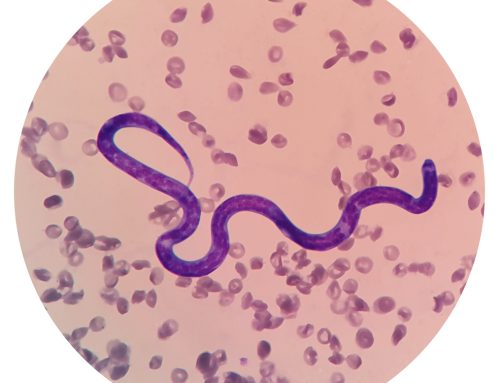When you take your dog or cat to see your veterinarian, do you always know why they are asking for permission to run certain tests on your pet? For instance, when the receptionist calls to confirm your appointment, and requests that you bring in a fresh stool sample, do you know why it is so important to test the feces for parasites? This blog will delve into the details a bit.
What is an intestinal parasite?
These are parasites that live in the intestines of the “host” species (such as a dog or a cat). Most are ingested on accident by the pet by eating contaminated soil, feces, or water (however some require an intermediate host). The most common intestinal parasites are the worms (roundworms, hookworms, whipworms, and tapeworms) and protozoans (single-celled organisms such as coccidia and Giardia).
Why are these parasites a problem for my pet?
Puppies and kittens are most at risk for the serious problems intestinal parasites can cause, however adult pets can suffer from some of these illnesses caused by the parasites as well.
- A heavy roundworm burden can stunt the growth of the growing puppy or kitten, cause diarrhea and sometimes vomiting, and a pot-bellied appearance.
- Hookworms attach to the lining of the intestines and feed on the blood of the animal it has infested. This can result in a severe anemia that can be life threatening.
- Whipworms can cause watery diarrhea, bloody diarrhea, and weight loss.
- Tapeworms require an intermediate host; there are 3 different species, and usually are not a problem for adults but can cause digestive upsets or stunting of growth in young animals.
- Giardia can cause severe diarrhea in young and debilitated patients.
- Coccidia can cause severe diarrhea, dehydration, and anemia, especially in younger patients.
Why are these parasites a problem for me?
Many of these parasites are zoonotic (transmissible to people). People ingest the organisms on accident. For example:
- Roundworms in people can travel to the eye and cause blindness (ocular larval migrans).
- Hookworms can travel through the skin causing a very itchy rash/skin eruption (cutaneous larval migrans).
- Giardia can cause severe diarrhea and intestinal cramping and nausea in people.
- Echinococcus (a species of tapeworm) cause hydatid cysts in the liver or brain.
How are intestinal parasites diagnosed?
A fresh stool sample (at least within 24 hours, ideally within 12) is submitted to your veterinary hospital. A fecal floatation is performed to check for ova (eggs) and single celled organisms (ie coccidia, Giardia). Results are usually back within the next day; check with your veterinary hospital for turn around time.
Is there anything I can do to protect my pet from intestinal parasites?
An annual fecal floatation is important to screen for parasites. Most monthly heartworm preventatives also prevent against roundworms and hookworms. Some are also labeled to prevent whipworm infestations. Talk with your veterinarian about the types of preventatives offered.
What if my pet has a parasite? Is treatment simple?
Some parasites are easier to treat than others. Your veterinarian will prescribe medication labeled to clear the infestation, but may warn you to constantly clean up your yard from feces to help prevent reinfestation. Make sure you give all medications as prescribed.
For additional information and/or questions, speak to your veterinarian at Twin Maples Veterinary Hospital at 937-866-5949.









Leave A Comment